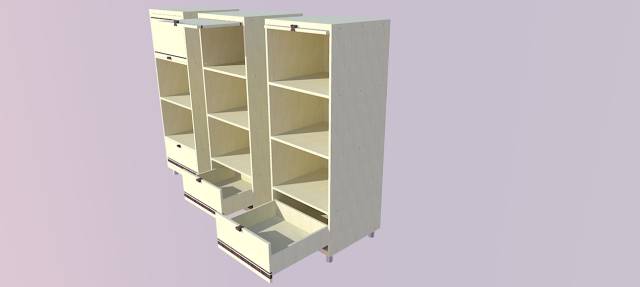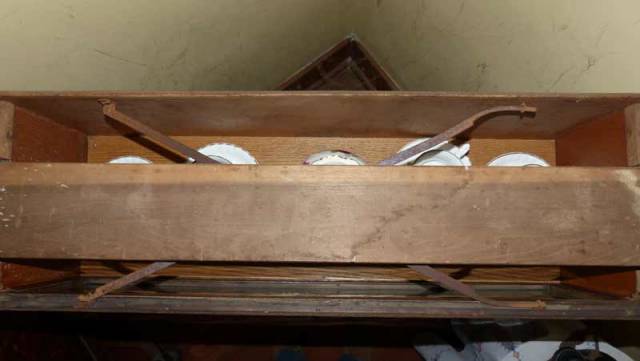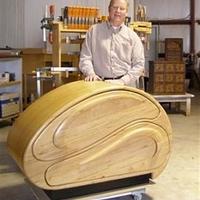
David E.
in almost 12 years
Barrister style door - Will it bind?
I am designing a microwave cabinet for our office, and decided to go with a barrister bookcase style door in one section. I stole the design for the door guides from the April 2007 issue of popular woodworking. I have a concern that pressure will be place on one side of the door more than another when opening, which could cause it to bind. Does anyone have any experience with this style door? If so, any advice on a method to reduce or eliminate the possibility of binding without adding any expensive hardware? Or do you think I’m over thinking it? I plan on using beeswax to reduce the friction between the dowels and dado, which should help a little.
Here is a rendering of the cabinet

And this shows the guide system. just a dowel in the door, used as a pivot point, which rides in a dado in the side of the cabinet.
Thanks for any suggestions!
David
11 Replies
David, I believe your support pegs, placed as far forward as possible, on both sides of the cabinet, will mitigate racking. Just don’t make the fit of the door overly tight ; keep humid conditions in mind for wood swelling. The dado and the door edge should be hardwood. ..And round off the top corners of the door as much as possible
By the way, if it’s anything like my office, the door will never be closed.
Most likely the doors will have a tendency to bind, it’s the nature of the design. I don’t think I’ve ever seen a barrister case that didn’t bind if not opened with some care. That being said, the ones I’ve seen that were the least problematic with binding had the ends of the hardwood pins in the door rounded. By rounding the end of the dowel it will have less surface area to bind.
Artisan Woodworks of Texas- www.awwtx.com
Yonak – I’ve designed it with an 1/8" of spacing all around, so it shouldn’t be too tight. Thanks for the suggestion to round off the top corners. I will definitely do that! Oh, and that part of the cabinet will be locked. I’m in trucking, and they need a spot to put the coffee and creamer for the office, without it disappearing into the sleeper units.
Bill – I kind of figured that was the case, but I just love the idea of it! I’ve never done them before, and I like being able to try new things. Just need to make sure I do it right, if they accept my proposal. I will take your advice and round off the pins to help. Thank you for the suggestion!
David,
Like Bill mentioned, that style door with that type of slide will probably bind if not opened carefully.
The dowel pins may cause some of the problem, but most of the time it’s simply because the door can rack and the door itself will bind in the opening. Both sides of the door has to remain parallel when being pushed back in the opening or it will bind.
Round everything as much as possible and wax the edge of the door along with the pins and track.
Good luck.
John @The Hufford Furniture Group
I love ’em too, I have 2 sets in my office as we speak (not made by me). The potential binding is just the nature of the beast. The only way I know to virtually eliminate it is to use dedicated hardware, an option you already know is expensive.
If you have the chance, experiment with the side tolerances. There seems to be a sweet spot with the right amount of side clearance and the rounded pins. Much like a drawer, either too tight or too loose causes binding while just right slides smooth as silk.
Keep us posted.
Artisan Woodworks of Texas- www.awwtx.com
Old barrister type doors have a scissor type guide to keep doors aligned and avoid binding. The attachment is rigid on one side except for the pivot on the door and the other side uses eye bolts to allow the scissor guide to expand and contract. Here’s a photo of an old guide system. Unfortunately I’d have to remove a structural brace to show the whole scissor guide.

I’m still waiting on a go or a no on this one. I submitted a proposal last week, and its supposed to be presented to the owner of the company next week. We are replacing our current vendor for our vending machines and such, and the current cabinet belongs to him. I’m excited about this one, mainly because of the door style. Everyone’s advice has been awesome, and I will keep you posted once I know yeah or neigh.
lwlllms – Your post got me searching, and one of the first articles I found after searching the term barrister bookcase scissor mechanism was this article:
http://metosexpo.free.fr/extra/wood_ebooks/finewoodworking/Fine_Woodworking%2020%20Bookcase%20plans/How%20to%20Build%20a%20Barristers%20Bookcase.pdf
It has the details of the scissor mech, as well as a band parallel mech, which seems a bit more complicated than I’m currently up for. I found some scissor mechanisms on ebay for around $16.00 that are off older bookcases, but the seller says they are rusted. I’ll see if I can’t find a source for them, or maybe try to make it myself from thin bar stock.
David,
You can buy the mechanism new, but they are pricey. Here’s one link;
http://www.vandykes.com/equalizer-hardware-for-bookcase-s4871/p/204777/
Good luck, hope you get the job.
John @The Hufford Furniture Group
I built mine without the mechanism and am careful when opening and closing. Just part of the design, as others indicate.
Suggestion: Replace the wooden pivot dowel with a metal dowel that slides in the dado. I bought 1/4in door hinge pins at HD and cut to fit. They will last a lifetime, unlike a wooden dowel in this use/case.
Just my 2¢ worth…
HorizontalMike
Mike, that’s a great suggestion. They probably don’t produce as much friction also, which would also be beneficial. Thank you!
David, you don’t even have to glue them in place or even make them super snug fit since they are capture fit between the dado and the window frame. 8-)
HorizontalMike











